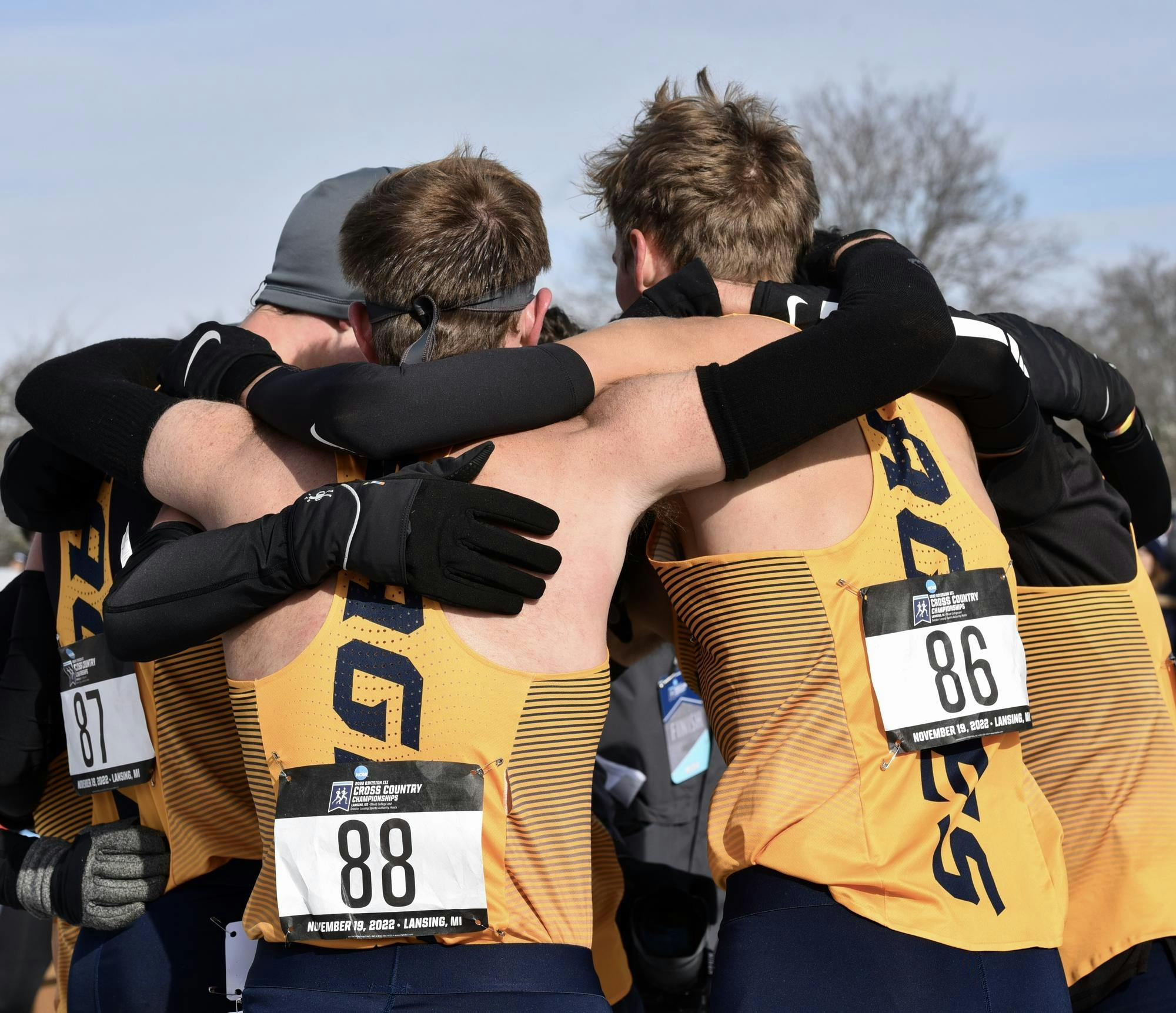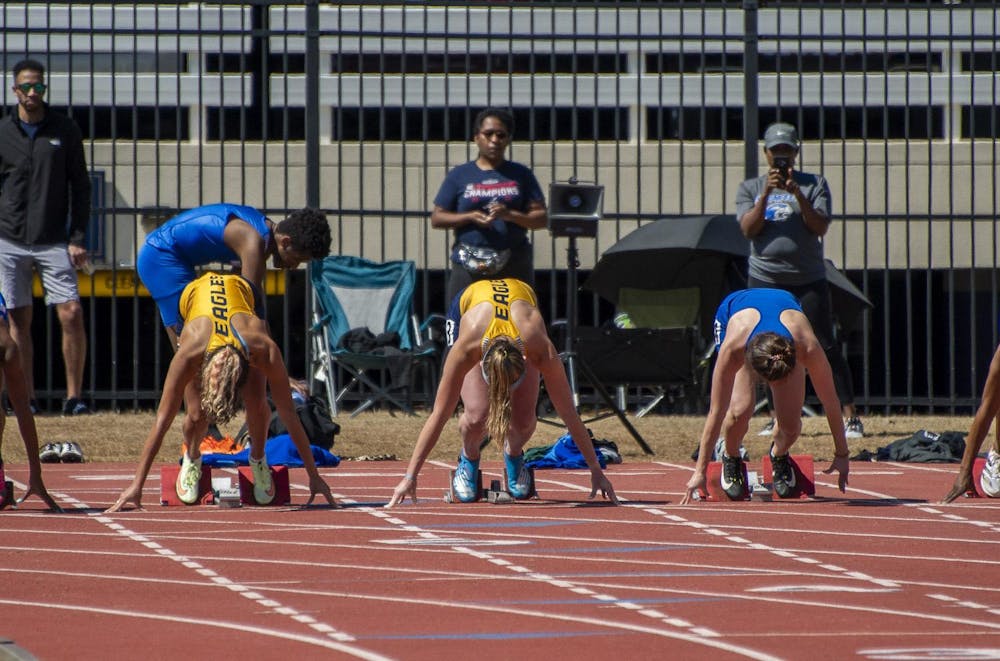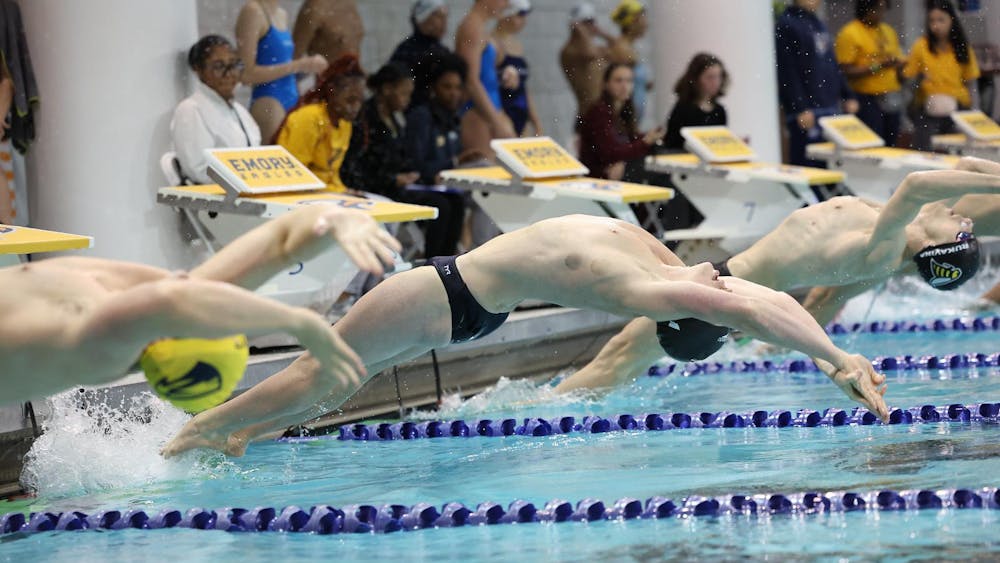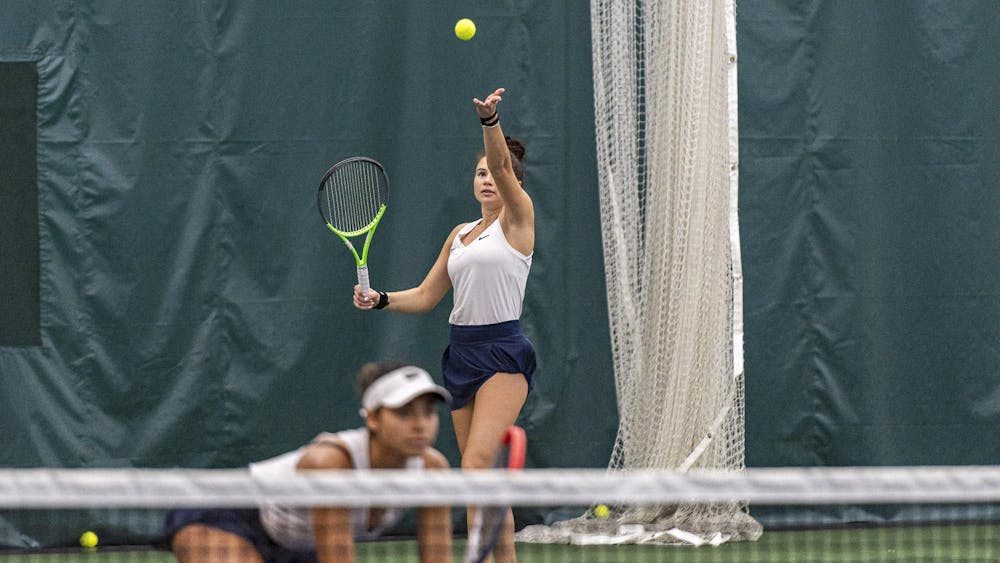During her sophomore year of college, former cross country and track and field runner Sarah Keane (25N) suffered a stress fracture in her shin. When Keane went to see a doctor for her injury, they sat her down and told her the fracture was a result of chronic stress and fatigue, both physically and mentally.
Keane said the team physician and athletic trainer made her feel like the injury was her fault — because she was not eating enough, sleeping enough or resting enough. In the summer before her junior year, Keane committed to following the trainer’s advice and hopefully reaching her full potential as a runner.
But as Keane entered the Nell Hodgson Woodruff School of Nursing in fall 2023, her anxiety rose. The challenges of waking up at 5 a.m. to train by herself before heading to nursing clinicals at 6 a.m. — and the fact that she wasn’t seeing linear progress in her running — caught up to her. When she realized her main reason for staying on the cross country and track teams was to complete all four years at the expense of her health, Keane decided to quit at the end of the semester.
“It was also hard because I had been doing this sport for so long,” Keane said. “After being injured so badly, it was a very hard mindset adjustment of, ‘How could doing something that I love so much hurt me so badly?’”
Keane is not alone. Several current students reported leaving the team after facing similar pressures, reminiscent of a trend that initially afflicted the track and field team four years ago.
A ‘Restricting and Isolating’ College Experience
For many student-athletes at Emory University, competing on a team comes with daily sacrifices. By making sports their second priority after academics, athletes said they often miss out on opportunities to be part of other communities on campus. For athletes who compete in sports all year, like those who run for the cross country team in the fall and the track and field team in the spring, fatigue and stress can build up and pose significant challenges.
Like Keane, Evan Woska (25B) left the cross country and track and field teams during his junior year because of several injuries, including stress reactions and a labrum tear in his hip. Although Woska was clear that he enjoyed being on the team and still has good relationships with his coaches, he recalled guidelines about what athletes could do off the track.
Early in his college experience, Woska joined several organizations at the Goizueta Business School. Although Woska said his coaches did not stop him from joining clubs, they preferred that their athletes avoided commitments at Emory that could negatively impact their performance at meets, including Greek life.
“If you're running at Emory, it's all you're essentially allowed to do,” Woska said. “The idea of doing anything other than running that would impact your sleep schedule was very frowned upon. … But, ultimately, they also want what’s best for you career-wise. They’re not going to stop you.”
Morgan Gallivan (26C) entered college seeking a healthy balance of these extracurricular activities, academics and athletics after the Emory coaches recruited her for the track and field team as a middle-distance runner. However, this quickly became impossible for Gallivan, as her coaches told her that she also had to compete in cross country — a sport she had no prior experience with.
During her first semester of college, Gallivan watched her roommate, who was only on the track and field team, branch out and make friends. But as a member of the cross country team, Gallivan had to dedicate her entire fall semester to running, which prevented her from exploring college in all the ways she had hoped. To Gallivan, only being friends with people within the team’s bubble was “restricting and isolating.”
When Gallivan voiced her concerns to her coaches about competing on the cross country team, she said it felt like she was shut down. Her coaches gave her an ultimatum: run cross country or forfeit her spot on the track team, according to Gallivan.
Unable to fully trust her coaches, Gallivan said she was anxious and walked “on eggshells” to avoid being kicked off the team. However, she officially left the team in the middle of her freshman year on Jan. 24, 2023 — her birthday.
“It just got to the point where I was unhealthy in multiple areas of my life that it felt like I needed to change something and give my body a break from the stress,” Gallivan said.
Assistant Vice President of University Communications Laura Diamond wrote in an email to The Emory Wheel that the University encourages student athletes to “engage in a variety of programs, student organizations and experiences that contribute to a well-rounded college life.”
Similarly, before Gallivan joined the team, she said Emory athletes and coaches told her she could maintain a healthy balance of academics and athletics while also seeking new experiences in college. But for Gallivan, learning a new sport while also adjusting to life at a new school made this unachievable.
Gallivan said she wished her former coaches had outlined their expectations more clearly to her before she came to Emory.
“There’s something that gets mixed up along the way of what you're expected to do and what you actually have to do, and that … catches people by surprise,” Gallivan said. “It makes people really miserable.”
Runners Lose Spot on Team After Going Abroad
Other cross country athletes have also faced unclear guidelines about participating in study abroad programs. Prior to going abroad in the spring semester of his junior year, former cross country and track and field athlete David Evans (25C) said he communicated his plans to head coach Linh Nguyen the year before. While he knew his spot was not guaranteed when he returned, Evans said Nguyen did not respond to his messages about how to keep up with his training while he was abroad, and he had to ask his teammates for workouts.
After months without communication, Evans said the coaches sent him an email offering him the chance to try out for the team again when he returned to Atlanta. Evans took the opportunity but was ultimately left off the team.
“I was under the impression that if I was clearly out of shape, I wouldn't be welcome back on to the team, but I really didn't think that was the case,” Evans said. “When I got an email back, there was no explanation or anything and we just weren’t welcome back on.”
Michelle Mittaz (25C), also a former cross country and track and field athlete, had a nearly identical experience when she went abroad during her junior year. Mittaz said she was frustrated by the lack of communication from her coaches while she was abroad and the way she was treated when she returned.
“I had been trying to reach out and this email was very impersonal,” Mittaz said, referencing the message offering a try out. “It's not like I was like a recruit or something. I would hope that these coaches knew me and had seen my growth over two and a half years on the team.”
Diamond wrote that while students have the option to study abroad, intern or pursue other off-campus opportunities, they must maintain the required level of performance for their team.
“Our athletic program is committed to excellence in competition and taking time away may be more feasible in some sports than others,” Diamond wrote. “Some varsity sports are seasonal, while others are year-round. We encourage student-athletes to continue training during their time away, and coaches are often available to provide recommended training plans.”
Director of Athletics Keiko Price-Carter forwarded the Wheel’s interview request to Diamond. The track and field coaches — including Nguyen, associate head coach Derek Nelson, assistant coach Jordan Anunike and former assistant coach Christopher Marco — did not reply to the Wheel’s requests for comment by press time.

The Weight of Division I Expectations at a Division III School
After transferring from North Carolina State University her sophomore year, junior diver Ren Watt (26B) said athletes’ academic motivations have been a meaningful change from her DI experience. She explained that watching teammates and other Emory student-athletes put a lot of effort into academics and athletics has been “very inspirational.”
“Here, no one has a scholarship,” Watt said. “Everyone shows high commitment to the sport and it's not like we're given excessive glitz and glamor of team apparel and getting free sports tickets to large football and basketball games. People do it because they love it and it's a lifestyle … we all grew up being active and want to continue it.”
However, some athletes have reported that their coaches’ expectations have blurred the line between DI and DIII, bringing an intensity that makes it difficult for athletes to continue the sport they love.
Five of the 13 head coaches at Emory — including Nguyen — have previously coached at Division I institutions, bringing their top-level experience to athletics programs that strive for excellence. Many other coaches were All-American athletes during their own collegiate careers. With these high athletic standards comes national success across Emory athletics.
So far in the 2024-25 academic year, both the men’s and women’s golf teams and the men’s soccer team claimed University Athletic Association titles, women’s soccer reached the NCAA Final Four and the women’s cross country team finished seventh at nationals — tying the program’s best-ever finish. Some student-athletes view these standards as a positive aspect of competing at Emory, Woska said, explaining that Division I standards push athletes to reach their full potential. However, Woska, who left the team due to injury and not the stress of the team, spoke highly of a DIII approach that allows athletes to pursue other extracurriculars in college.
“If a coach adopts a DIII mentality, it basically means that they don't care about the team's success, so it's give and take,” Woska said. “From my perspective as an athlete, I wanted more of the DIII mindset because I love running, but I love other things too, and I didn't think it was fair. But I think it would be a sign of a bad coach to adopt that mindset.”
Gallivan said she was glad that the track coaches expected their athletes to be committed to the program, but she believes that high expectations should also exist with more flexibility for athletes to make time for other extracurricular commitments.
“We have so many other extracurriculars that are not athletics that I was excited to do in college because in high school I did all sports,” Gallivan said. “But then it felt like that was taken away when I got here, when I realized, ‘Oh, they really just want me to focus on the team.’ … They just didn't really care about our well-being as much as they cared about how good of an athlete I could be.”
Keane said that many cross country and track and field athletes make the sport their second priority after academics. For Keane, it became incredibly challenging to balance her commitments to the cross country and track teams with academics, community service, working a job and having a social life. She said that her athletic commitment prevented her from being a “whole person.”
“If you want to have a perfect GPA, you'll stay in the library all the time,” Keane said. “If you want to be the best runner, you'll do everything you can to be the best runner, and then you lose other parts of your life that will help balance that out.”
Mittaz said that while she understands the coaches’ livelihoods are dependent on their teams’ success, she believes some coaches may not recognize that many athletes come to DIII schools to take advantage of more than just athletic opportunities.
“There's a reason why most athletes here are committing to Division III and not a Division I school, and it's because we're really motivated with athletics, but also really motivated with academics and extracurriculars and being well-rounded,” Mittaz said. “Sometimes I felt like that was maybe the disconnect.”
These issues, Gallivan said, have cost the cross country and track and field teams several athletes over the years. In February 2020, The Emory Wheel reported that 38 track and field team members left the team within the previous year. This came shortly after Nguyen’s arrival in 2018.
In June 2019, Nguyen set 45 new rules regulating team and individual behavior during the season. Many former athletes told the Wheel in 2020 that they left the teams because of the strict policies, which prohibited them from playing intramural sports or wearing non-Emory colors during practices.
"In cross country, retention rates are so low, and that should be a greater concern looking at DIII athletics, especially Emory, because no other team has a problem this big," Gallivan said. "No other team has that many athletes that drop out, so there's something that in their program that isn't lining up."
However, Nguyen told the Wheel in 2020 that he believed the new rules were not “unreasonable” and intended to improve the program that was previously lacking commitment from its athletes.
“It was a pretty clear pattern of people not coming to practice [or] meets and leaving meets and practice early,” Nguyen told the Wheel in 2020. “I think the team overall felt that those values were important [and required] a great commitment.”
Finding a Better Balance Between Academics, Athletics, College Life
While Keane was injured during her sophomore year, she spent time with peers who were not athletes and saw the way they lived. Their lifestyle, Keane said, “looked like freedom.” Since leaving the cross country and track and field teams, Keane has invested more time in nursing school and joined the ultimate frisbee club, which she described as a “refreshing” new athletic community. For Keane, opportunities for growth have been numerous since leaving the teams.
“There's been … a lot of things that I've done to learn about myself as a person and grow as an individual that I couldn't do when I was going to bed worried about the next workout that I had the next morning,” Keane said.
Woska said he has also had more time to dedicate to other pursuits, like building a real estate company and golfing, but he does not regret the sacrifices he made to compete in college.
“Being on the men's cross country and track teams at Emory is probably the best decision I ever made,” Woska said. “There's obviously trade-offs with that, but it's such a good group.”
Keane and Gallivan said teams could remedy the social isolation that some athletes experience by helping them connect with the broader Emory community. Keane suggested requiring freshmen on the cross country and track teams to complete first-year orientation. Keane was unable to attend orientation because of a training camp, but athletes were able to this year, so she hopes this becomes a standard policy. Gallivan noted that by encouraging student-athletes to branch out socially, their overall well-being at Emory could be improved.
“I felt like I had to connect with my team and do everything team-wise, which is so important,” Gallivan said. “But I also think there's something so important about having a support group that's greater than just your team.”
Visual & Web Editor Natalie Sandlow (25C) is a former member of the cross country and track and field teams. She had no role in writing or editing this article.

Madeline Shapiro (she/her) (26C) is from Stamford, Conn., majoring in creative writing and classic civilizations. She manages the Wheel’s sports and multimedia sections. Outside of the Wheel, Shapiro can be found playing low-stakes games of soccer, spending time outdoors and watching as many Premier League games as possible.






